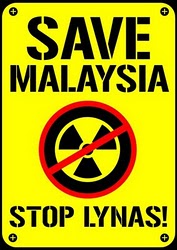 Earlier this month, I wrote about a growing confrontation in Kuantan, Malaysia regarding a planned rare earth mining facility to be opened by an Australian corporation. The plant – which would become the world’s largest of its kind and the first rare earth refining operation built outside of China in many years – had been the cause of local protests due to the potential harmful environmental consequences which are the results of the byproducts of several rare earth metals.
Earlier this month, I wrote about a growing confrontation in Kuantan, Malaysia regarding a planned rare earth mining facility to be opened by an Australian corporation. The plant – which would become the world’s largest of its kind and the first rare earth refining operation built outside of China in many years – had been the cause of local protests due to the potential harmful environmental consequences which are the results of the byproducts of several rare earth metals.
I believe my article, which first appeared at the Foreign Policy Association’s blog, was objective in every sense of the world. I laid out the situation, presented arguments from both sides of the debate, and ended the posting with a cautious warning that the environment is as precious a commodity as any rare earth metal found in the earth’s crust and we, as a global society, need to do what we can to protect it.
A slightly edited version of the article was picked up and syndicated at The Diplomat, a leading English language online news publication for Asian and Pacific affairs. I’ve written quite a few articles for The Diplomat (I am listed as one of five authors for their successful ASEAN Beat blog) and, to its credit, their editors are as fair and balanced as an aspiring writer could hope for; they have never rejected a pitch of mine, regardless of the political slant my articles may sometimes take.
Almost within minutes of its posting, the comment section of the article was afire with searing criticism from what can only be described as a collection of pro-corporate wardens set out on a mission to defend the company in question, Lynas Corporation, and to verbally attack me as some kind of Marxist-environmentalist who never would have brought up the issue had it been an American company.
“You have some fact checking to do,” said one reader. “Globalization is a part of this world, like it or not. Either offer suggestions for change…or stop whining.”
Another commentator, “Arvan,” felt I was simply another bleeding-heart liberal who belonged in academia, rather than the real world. “I think the terms ‘globalized corporations’ versus ‘indigenous populations’ says all you need to know about LaRocco. Malaysia is merely a canvas for him to draw his university-bound Marxist fantasies.”
“Eco-porn” was how another person described the post. “It’s nice to have US [writers] flushing the toilet on non-US countries’ economic opportunities.”
I was a bit perplexed by this at first. I was glad that a piece of mine was getting hits – and doubtless, so were the editors – but I have written some pretty slanted material before and I honestly felt that this article was not the least bit subjective. I ran a search on Twitter and discovered an interesting development: someone along the line had attached a hash mark to the words “anti-globalization” to go along with “rare earth” and “protests” to a Tweet which linked the article.
Now I don’t know for certain who exactly these anonymous posters are, but who among us, on the left or the right, willingly and unabashedly boasts of being pro-corporation these days? I would hazard to guess not many. I am also not naming or shaming anyone, I am just saying it was a bit strange.
I reached out to a global supply chain expert specializing in rare earth metals to get his take. Patrick Fitzgibbons, a member of the Colorado Democratic Party’s Executive Committee for climate solutions, remarked that my analysis was “fair and accurate.” The article was also picked up by the progressive publication Dissent Magazine, where it enjoyed a more welcome reception. Even so, the online content manager indicated to me that there was nothing overtly draconian or biased in the article.
Let this then be a fair warning to Shunji Iwai, the bold Japanese filmmaker and director who is putting together a documentary on nuclear radiation following the meltdown in his native country after it was rocked by an earthquake and subsequent tsunami in March. Iwai plans to highlight Lynas’ plan for Kuantan in his film in an effort to raise public awareness both to the potential radioactive fallout from the process of rare earth refining as well as to the grassroots local campaign to stop Lynas from proceeding. I’m sure the corporate globalizers will be just as thrilled with news of this development as they were when they read about the story from yours truly.